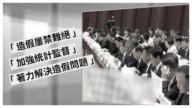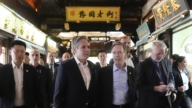【新唐人2011年12月23日訊】國際學術界普遍認為,多黨制下的黨派競爭有利於遏制腐敗,但中國社科院政治學研究所所長房甯撰文《多黨制會導致政治腐敗》,文章在中共媒體廣泛轉載。學者對此認為,這是作者無視世界現實的閉門造車,是一黨專制的辯護詞,不具備學術觀點。
房寧在《多黨制下的政治性腐敗》一文說,「經過在韓國、印尼和泰國的調研,印尼及泰國等東南亞國家的情況正好相反:政黨之間不僅沒有形成相互監督的遏制腐敗機制,反倒是結成了腐敗的分贓同盟。」中共官方人民網、光明網等轉載了房甯這篇文章。
《北京之春》主編胡平: 「第一,他的觀點在理論上站不住腳,第二,在事實上也不符合實際。正是毛時代的倒行逆施,政治上的高壓、經濟上的一塌糊塗、文化上的蕭條,是大家都感到共產黨那一套是不好的、惡劣的、無論從哪個方面都是很糟糕的,所以才萌生了對民主制度的要求。」
胡平認為,毛時代剝奪個人的言論自由、信仰自由、出版結社等等的自由,才造成那麼大的災難,僅文革思想不對頭受迫害的人以千萬計。是中國人對自由民主的要求,才推動社會走向改革開放。
房甯聲稱,多元民主體制下經常發生的政黨輪替,使政治性腐敗行為趨於短期化、嚴重化,而且政治性腐敗涉及政黨乃至執政黨的利益,因此往往會得到政治保護。
胡平認為,有了自由民主制度,就沒有了政治迫害,有事大家能商量、充分的交換意見,當然比獨裁製度要好得多。
胡平:「有了自由民主不等於一切問題得到解決,他只是解決問題的方法,不等於問題本身得到解決。同樣有了自由民主,我們有了解決腐敗問題很好的方式,那也不等於一旦有了自由民主,腐敗統統絕跡。」
中國民主黨領導人陳樹慶則認為,反腐敗最好的辦法是權力制衡,包括行政、立法、司法相互間的制衡和監督,當然也包括公民對國家、和在野黨對執政黨的權力制衡。現在世界最腐敗的反而都是獨裁國家。
中國民主黨領導人陳樹慶:「一黨專制的絕對權力肯定導致絕對的腐敗,他說的話簡直無視世界各國的政治現狀。那個所謂學者的話,是經不起世界各國的事實辯駁的,無非是拍拍馬屁而已,說不定想陞官發財。」
陳樹慶認為房甯的觀點像是閉門造車,中共「裸官」就是最好的反證。而中國的很多問題最後都歸於制度問題。
陳樹慶:「中國普通公民、各行各業的很多事情,包括權利受到了侵犯,應有的權利得不到尊重、法律的保護,最後都是遇到體制上的障礙,得不到解決。」
房寧還寫道,「從美國政治制度發展的歷史看,兩黨政治不僅不能有效的遏制腐敗,反而是引發腐敗的一個重要原因。」
對此,胡平指出,把他的話翻譯成政治語言就是,中共宣佈不搞多黨制,只搞一黨專制。但一黨專制就要壟斷權力。所以它的惡劣就在:你們不能反腐敗,只能我反,你們誰反腐敗就把你抓起來。
陳樹慶也表示,一個學者連「絕對的權力導致絕對的腐敗」都不明白的話,不知道他的知識學到哪裏去了。
新唐人記者常春、宋風、蕭宇採訪報導。
“Multi-Party System Can Lead to Political Corruptions”?
The international academic community generally believes
that the multiparty competition helps curb political corruption.
However, Fang Ning, director of Political Science Institute
at the Chinese Academy of Social Sciences, thinks otherwise.
In his article, Fang Ning states,
“The multi-party system can lead to political corruptions."
The article has been widely reproduced by the CCP
(Chinese Communist Party) official media.
Scholars view Fang’s remarks as non-academic,
ignoring the reality and defending the one-party dictatorship.
The article is entitled,
“The political corruptions under the multi-party system."
It states, “After conducting researches in South Korea,
Indonesia and Thailand,
we found that in Southeast Asian countries the opposite is true:
instead of forming a mechanism to mutually monitor and curb
corruption, the multi-party system, forms a carve-up alliance."
People’s Daily, Guangming Daily and other CCP mouthpiece
media reproduced the article.
Hu Ping (Chief Editor, Beijing Spring magazine):
“Firstly, his view is theoretically untenable.
Secondly, it doesn’t conform to the reality. Why are people
disgusted by the CCP’ stuff, thinking it’s terrible and wicked?
It』s just due to Mao’s era retroactions, high-handed political
environment, awful economic mess and cultural stagnancy.
Thus the populace began to demand a democratic system."
Hu Ping believes in Mao’s era the deprivation of
individuals’ freedom of speech, belief,
press and assembly, among others,
is the reason for so many great disasters in China.
Tens of millions of people were persecuted simply due
to Mao’s wrong idea launched the Cultural Revolution.
Only after the Chinese people’s started to demand freedom
and democracy, was the society pushed forward to open-up.
Fang Ning claims that under pluralistic democratic system,
frequent political changes bring faster and worse corruption.
Moreover, political corruption involves interests of political
parties and the ruling party, thus it tends to get political protection.
Hu Ping says that with liberal democracy,
no political persecution will exist.
People can freely discuss and have full exchange of views.
That will be much better than in a dictatorship.
Hu Ping: “Freedom and democracy doesn’t mean all issues
are getting solved, but there are approaches to the solution.
Likewise, enjoying freedom and democracy, we can have
a good way to solve corruptions, but it doesn’t mean all corruptions will be extinguished."
Leader of Democratic Party of China, Chen Shuqing, says
The balance of power is the best anti-corruption.
Like balances among the executive, legislative and
judicial government branches and mutual supervisions;
as well as balances between citizens and government;
and balance between opposition party and the ruling party.
In the current world, the most corrupt countries
are those under some form of dictatorship.
Chen Shuqing: “The absolute power of one-party autocracy
certainly leads to absolute corruption.
His talk simply ignores the political status quo in the world.
The so-called scholar’s remarks can’t bear the reality’ rebuttal.
It’s nothing more than flattering the regime
for personal benefits."
Chen believes that Fang Ning’s view sounds
like creating artwork without a ground.
And the best counter evidence for it
are the CCP’s “naked officials."
While many problems in China were finally found
to be attributed to the institutional problem.
Chen Shuqing: “Many problems that China’s ordinary citizens
face, even those matters taking place in various sectors,
such as rights violations, no legal protections etc., are all
found to face institutional barriers, and can’t get resolved.”
Fang’s article also says, “The U.S. political system history
witnessed that both political parties are far from effectively curbing corruption occurrences,
but it became an important cause of triggering corruptions."
Hu Ping translates the political message of Feng’s words as:
CCP rejects the multi-party system implementation and it will remain a one-party dictatorship.
Hu points out that the one-party dictatorship
means monopoly of the power.
So its depravity is: you can’t oppose corruption but I can.
Anyone daring to fight corruption will be subjected to arrest.
Chen Shuqing adds, if a scholar cannot understand
the meaning of “absolute power leads to absolute corruption,"
then it raises the question of where has the scholar’s
knowledge gone?
NTD reporters Chang Chun, Song Feng and Xiao Yu



























